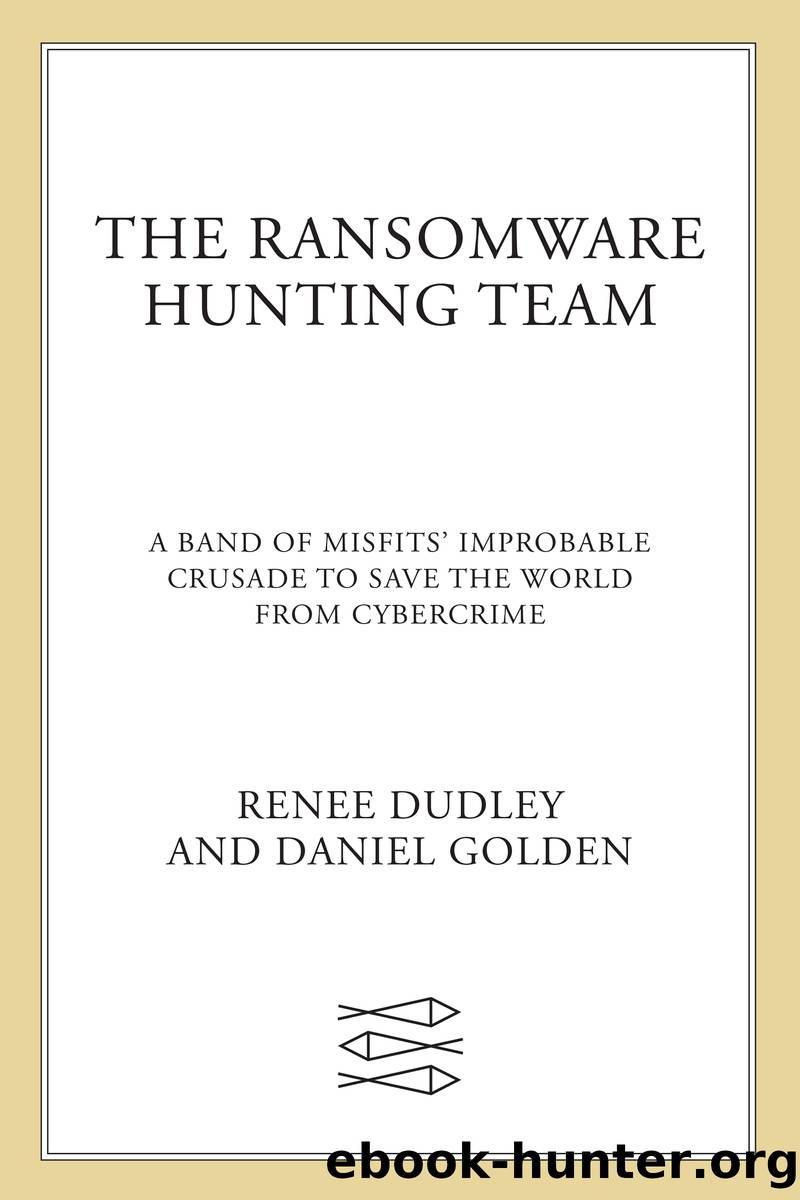The Ransomware Hunting Team by Renee Dudley

Author:Renee Dudley
Language: eng
Format: epub
Publisher: Farrar, Straus and Giroux
* * *
By 2012, FBI leadership recognized that most crimes involved some technical elementâthe use of email or cell phones, for example. So that year, it began to prioritize hiring non-agent computer scientists to help on cases. These civilian cyber experts, who worked in field offices around the country, did not carry weapons and were not required to pass regular physical fitness tests. But respect for the non-gun-carrying technical expertsâthe kind of appreciation that John Fokker of the HTCU describedâwas lacking. This widespread condescension was reflected in a nickname that Stacy Arruda, the early NIPC agent who went on to a career as a supervisor in the Cyber Division, had for them: dolphins.
âSomeone who is highly intelligent and canât communicate with humans,â said Stacy, who retired from the FBI in 2018. âWhen we would travel, we would bring our dolphins with us. And when the other party started squeaking, we would have our dolphins squeak right back at them.â
If agents like Milan and Anthony had a hard time winning the institutional respect of the FBI, it seemed almost impossible for the dolphins to do so. They worked on technical aspects of all types of cases, not just cyber ones. Yet, despite the critical role they played in investigating cyber casesâsometimes as the sole person in a field office who understood the technical underpinnings of a caseâthese civilian computer scientists were often regarded as agentsâ support staff and treated as second-class citizens.
Randy Pargman took a circuitous route to becoming the Seattle field officeâs dolphin. In many ways, Randy and Michael Gillespie are kindred spiritsâsoft-spoken, self-described nerds with an understated passion for public service. Randy came to love computers the same way Michael did, through ham radio and from his grandmother.
As a kid in California, Randy regularly hung out with his grandma, who was interested in technology. She bought magazines that contained basic code and helped Randy copy it onto their Atari video game console. It was his introduction to computer programming. Later, as a teenager, Randy was drawn to a booth of ham radio enthusiasts at a county fair and soon began saving up to buy his own $300 radio. It was the early 1990s, before most home users were online, so Randy was thrilled when he used the radio to access pages from a library in Japan and send primitive emails.
After high school, Randy put his radio skills to work when he became a Washington State Patrol dispatcher. Although it wasnât a part of the job description, he created one computer program to improve the dispatch systemâs efficiency and another to automate the stateâs process for investigating fraud in vehicle registrations. The experience led him to study computer science at Mississippi State. In the summer of 2000, while still in college, Randy completed an FBI internship, an experience that left him with a deep appreciation for the bureauâs mission. So, following brief stints working for the Department of Defense and as a private-sector software engineer once he graduated, he applied to become an agent.
Download
This site does not store any files on its server. We only index and link to content provided by other sites. Please contact the content providers to delete copyright contents if any and email us, we'll remove relevant links or contents immediately.
| Cryptography | Encryption |
| Hacking | Network Security |
| Privacy & Online Safety | Security Certifications |
| Viruses |
Effective Threat Investigation for SOC Analysts by Yahia Mostafa;(7486)
Practical Memory Forensics by Svetlana Ostrovskaya & Oleg Skulkin(7204)
Machine Learning Security Principles by John Paul Mueller(7159)
Attacking and Exploiting Modern Web Applications by Simone Onofri & Donato Onofri(6831)
Operationalizing Threat Intelligence by Kyle Wilhoit & Joseph Opacki(6796)
Solidity Programming Essentials by Ritesh Modi(4586)
Microsoft 365 Security, Compliance, and Identity Administration by Peter Rising(4180)
Operationalizing Threat Intelligence by Joseph Opacki Kyle Wilhoit(3929)
Building a Next-Gen SOC with IBM QRadar: Accelerate your security operations and detect cyber threats effectively by Ashish M Kothekar(3678)
Learn Computer Forensics - Second Edition by William Oettinger(3678)
Future Crimes by Marc Goodman(3592)
Blockchain Basics by Daniel Drescher(3574)
Mastering Azure Security by Mustafa Toroman and Tom Janetscheck(3542)
Mastering Python for Networking and Security by José Manuel Ortega(3494)
Incident Response with Threat Intelligence by Roberto Martínez(3410)
The Code Book by Simon Singh(3180)
Mastering Bitcoin: Programming the Open Blockchain by Andreas M. Antonopoulos(3036)
Mobile App Reverse Engineering by Abhinav Mishra(2999)
From CIA to APT: An Introduction to Cyber Security by Edward G. Amoroso & Matthew E. Amoroso(2915)
